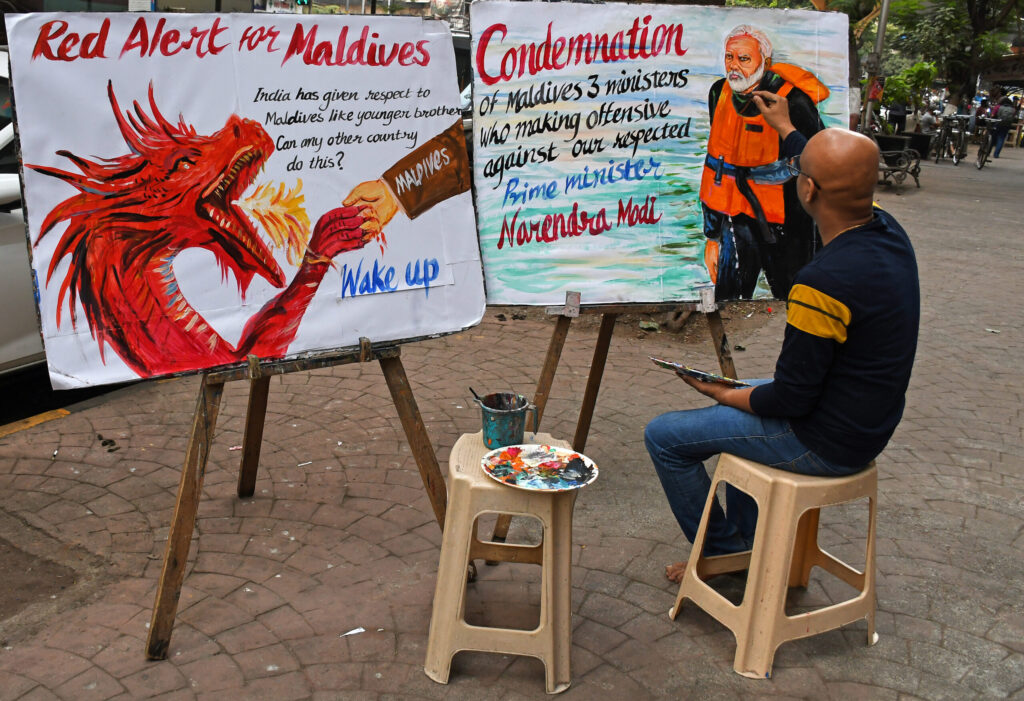Indian Prime Minister Narendra Modi’s January 2024 visit to the Lakshadweep islands has led to diplomatic fallout between New Delhi and the Maldives. This has further strained an already uneasy relationship that has worsened since Maldivian President Mohamed Muizzu assumed power in November 2023.
The controversy erupted after Modi supporters compared Lakshadweep with the Maldives as an alternative tourist destination. Soon, supporters of both Modi’s and Muizzu’s governments resorted to mudslinging. The situation worsened when three deputy ministers in Muizzu’s government waded into the social media debate, making disparaging remarks against Modi.
India’s Ministry of External Affairs summoned the Maldivian ambassador to express its concerns and there was backlash on social media, led by celebrities and netizens urging a travel boycott of the Maldives. In the aftermath, Indian tourists fell to fifth position in tourist arrivals to the Maldives for January 2024.
Fearing an impact on its tourism industry — which contributes around 20 per cent to the Maldives’ GDP and of which Indian tourists comprise the largest share — the Maldivian government entered damage control mode. The government suspended the three deputy ministers and distanced itself from the ministers’ remarks.
Amid the crisis, Muizzu was on a five-day visit to Beijing, where China and the Maldives announced the elevation of ties to a comprehensive strategic cooperative partnership and signed 20 new agreements. While Muizzu did not publicly comment on the ministers’ remarks, he urged China to reclaim the top spot for tourist arrivals in the Maldives.
The escalation reflects how hyper-nationalistic domestic politics, sustained by ruling parties, can spiral into the domains of foreign policy and diplomacy.
Public discourse in India about the Maldives is portrayed through an India–China lens. The Maldives’ presidential elections between former president Ibrahim Solih and Muizzu were portrayed as a contest between pro-India and pro-China candidates. While Muizzu campaigned on an ‘India Out’ platform, calling for the removal of Indian military personnel from the islands and reviewing security ties with India, the election was also fought on the economy, a housing crisis and public debt. The Indian media provided scant coverage of these issues.
Muizzu’s ‘India Out’ platform, championed by former Maldivian president Abdulla Yameen, was in response to Solih’s ‘India First’ policy. The Maldivian opposition has campaigned vigorously for the ousting of Indian military personnel from the island — a campaign at times based on disinformation.
These disinformation campaigns worked in favour of the opposition by creating anxieties about India’s apparent interference. New Delhi’s own treatment of its Muslim minority also emboldened these sentiments.
Since coming to power, Muizzu has done little to temper these anxieties, keeping his political constituency mobilised for parliamentary elections scheduled for April 2024. The social media controversy and the attitudes of the Indian and Maldivian publics should be seen against the backdrop of political parties politicising foreign policy issues to mobilise their domestic constituencies.
The Maldives also remains anxious over the development of Lakshadweep, a union territory of India. Minicoy, an island of Lakshadweep, was ruled by Maldivian kings before it came under the suzerainty of the East India Company and later the British Crown. In a 1956 referendum, Minicoy decided to join India and was incorporated into Lakshadweep. It shares cultural, religious and linguistic ties with the Maldives, even speaking the same Divehi language. The island has emerged as a point of controversy between the two states.
In 1982, Abdulla Hameed, the brother of then-Maldivian president Abdul Gayoom, referred to Minicoy as part of the Maldives. Tensions eased when the president clarified this was to affirm religious and linguistic affinity rather than political unity.
In 2021, Praful Patel, the administrator of Lakshadweep, banned beef and promoted luxury beach resort tourism akin to that in the Maldives. This caused resentment both in Lakshadweep and the Maldives. A Maldivian media outlet reported the story as India imposing ‘autocratic rules in Minicoy’ that tamper with local traditions. Lakshadweep locals have argued against the development of Maldivian-style tourism due to the islands’ fragile ecosystem.
Social media discourse about boycotting the Maldives is an example of how the hyper-nationalism of India’s ruling Bharatiya Janata Party empowers its supporters to reproduce its ideology in the public sphere. While states must conform to diplomatic etiquette, non-state actors are less restrained.
Even as Modi’s government transforms the domestic polity through Hindu nationalism, it has struggled to recreate this in foreign policy. This is where non-state actors become useful for the government in airing its hyper-nationalistic foreign agenda.
This was visible when Modi supporters clamoured to support Israel after the 7 October attack. Similarly, in the Maldivian saga, Indian netizens, celebrities and businesses called for a boycott of the Maldives. The Indian Chamber of Commerce — an influential trade association and advocacy group — urged tourism and trade associations to suspend their operation in the Maldives. Online travel company EaseMyTrip also suspended all flight bookings to the Maldives. The Modi government’s muted response to the boycott points to its implicit support.
While the three ministers’ comments were needless provocations, calls for a boycott of the Maldives point to the dangers of hyper-nationalism spiralling into diplomacy. The jingoistic public discourse only fuels negative perceptions of New Delhi in the neighbourhood. In a region, that has overlapping religious, cultural, ethnic and linguistic boundaries, such nativist movements are bound to spill into regional geopolitics and make cooperative projects harder to achieve.
New Delhi needs deft diplomacy to engage with its neighbours, as China expands its footprint in the region. But recent events indicate there is a lack of imagination and strategy to appreciate the region’s bubbling concerns and their interplay with India’s domestic politics.
Rishabh Yadav is a PhD student at MMAJ Academy of International Studies, Jamia Millia Islamia, New Delhi, where he focusses on the construction of state identity and its relationship with the international order.

